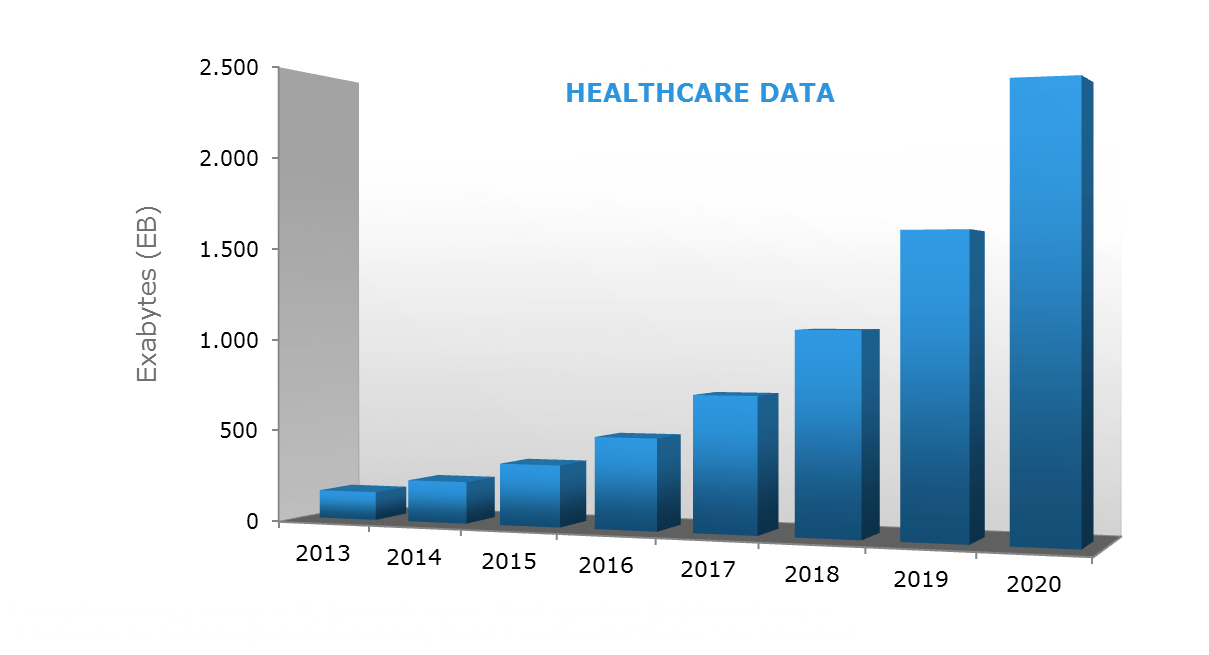The Data Growth Challenge in Healthcare
According to the EMC Digital Universe with Research & Analysis by IDC Healthcare[1] data growth is one of the fastest across many industries. A 48% annual growth rate will lead to 2,314 Exabytes of data in 2020.
Source: EMC Digital Universe with Research & Analysis by IDC
The reasons for this data growth rate are many and include new healthcare applications and regulatory / compliance challenges and continued introductions of new technology and equipment that incorporate data-intensive next generation diagnostics.
The growing data sets will enable healthcare providers to make quicker information-driven decisions, increase efficiency, support remote diagnostics, and provide better collaboration.
For Electronic Health Record (EHR), additional unstructured data such as voice, video, and text are now being stored. New diagnostic and other healthcare applications are also growing with increasing use of medical images and studies with larger images sizes. Or, the deployment of clinical next generation sequencing will contribute to the 48% annual growth rate in healthcare data.
All these data must comply with country and state regulations including long retention periods. Those regulatory compliance requirements are an additional key data growth driver.
Another challenge of data growth is finding the right data at the right time. Big Data analytics enables healthcare providers to focus in on data most useful for diagnostics, treatment, and discovery.
The Data Management Challenge in Healthcare
Factors that are forcing healthcare organizations to rethink their storage strategies include:
More data must be stored: Storage capacity requirements continue to grow significantly with the shift to data-intensive healthcare. As the number of storage devices increases, so too does the need of IT resources to maintain the infrastructure.
Inefficiency in storage capacity: In most healthcare organizations, storage is typically deployed and managed by diagnostic functions or departments and capacity is not shared between modalities. This may lead to spare capacity for one modality while others need to be upgraded continuously. With a siloed approach to storage, extra capacity cannot be shared, thus increasing CAPEX and OPEX cost.
Changing data retention requirements: Patient records, digital diagnostic images, and clinical study results are now stored for longer periods of time. Some data can move into a ‘cold archive’ while other healthcare data needs to be immediately accessible online
Merger and acquisitions are increasing. According to the latest analysis by Kaufmann Hall & Associates, LLC, the number of hospital transactions announced in 2015 grew 18 percent compared to 2014. Healthcare organizations now own multiple hospitals, clinics, long term care facilities, and physician practices across a large geography. It isn’t practical in all cases to maintain a central data center at all places and it makes sense to have smaller regional data stores that can tier to a centralized “data hub”.
Is there a better solution?
Over the last years, we’ve made a tremendous investment into a scale-out Network Attached Storage solution. EMC Isilon easily scales with a push of a button and with the same pace of the data growth. EMC Isilon can seamlessly scale on demand, enabling healthcare organizations to add Petabyte of storage or expand performance “on the fly”. Every Isilon cluster is a single pool of shared storage eliminating the need to deploy a storage silo for each modality or department. Last year we introduced the concept of a “Data Lake”, enabling healthcare organizations consolidate their data into a central data repository. Through the multi-access methods supporting different healthcare applications, organizations can store, access, share and even analyze the data stored in one location without the need to copy the data from one storage silo or infrastructure into another. If needed, different access zones and data encryption ensures data security and data separation without compromising the “Data Lake” concept.
Very recently EMC announced the “Data Lake 2.0” with the introduction of OneFS 8.0 providing capabilities to expand the “Data Lake” from the “edge” to the “core” (the centralized data repository) to the “cloud”.
IsilonSD Edge is a software-defined storage solution running on commodity hardware in a VMware environment. IsilonSD Edge expands the “Data Lake” into remote locations or departments with smaller data storage requirements. This capability provides great efficiency and cost advantages in particular for larger healthcare organizations owning multiple geographical distributed healthcare facilities.
EMC Isilon CloudPools enables healthcare organizations to tier data off their central (“core”) Isilon cluster to either a private in-house cloud based on EMC Elastic Cloud Storage (ECS) or another Isilon cluster or into a public cloud for archiving as older patient related data may need to be stored for the life of the patient. This cost effective extension of the “Data Lake” provides encryption capabilities for security purposes and compression to minimize storage capacity requirements and bandwidth usage.
The extended “Data Lake” is managed through one management interface and regardless where the data is stored the records are immediately accessible.
Better Healthcare Data Management
The combination of EMC Isilon hardware, OneFS 8.0, IsilonSD Edge, and Isilon CloudPools delivers the capabilities needed to meet the growing data challenges facing healthcare organizations today and tomorrow. Our aim is to provide healthcare organization a storage investment protection and reduced OPEX & CAPEX by providing a solution that scales on demand in line with the data growth rate across the organization.
[1] http://www.emc.com/analyst-report/digital-universe-healthcare-vertical-report-ar.pdf
